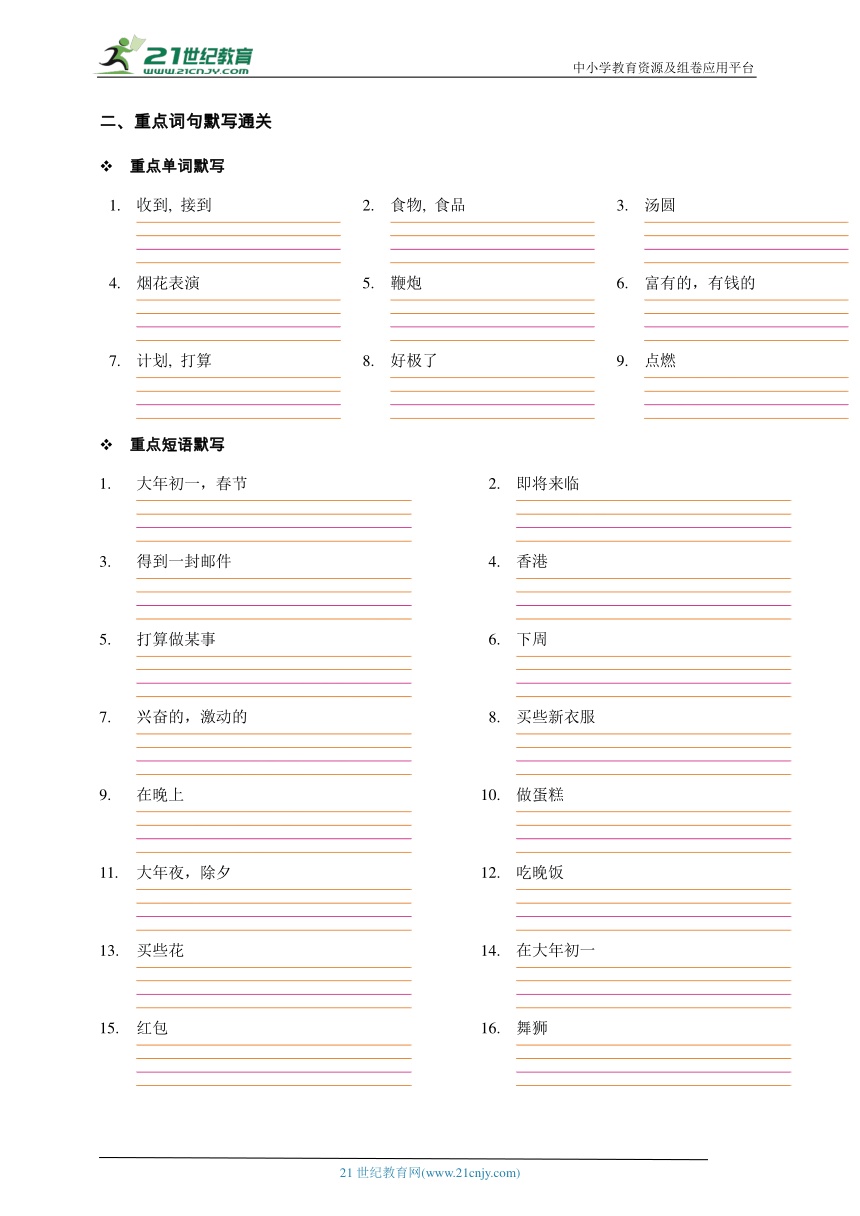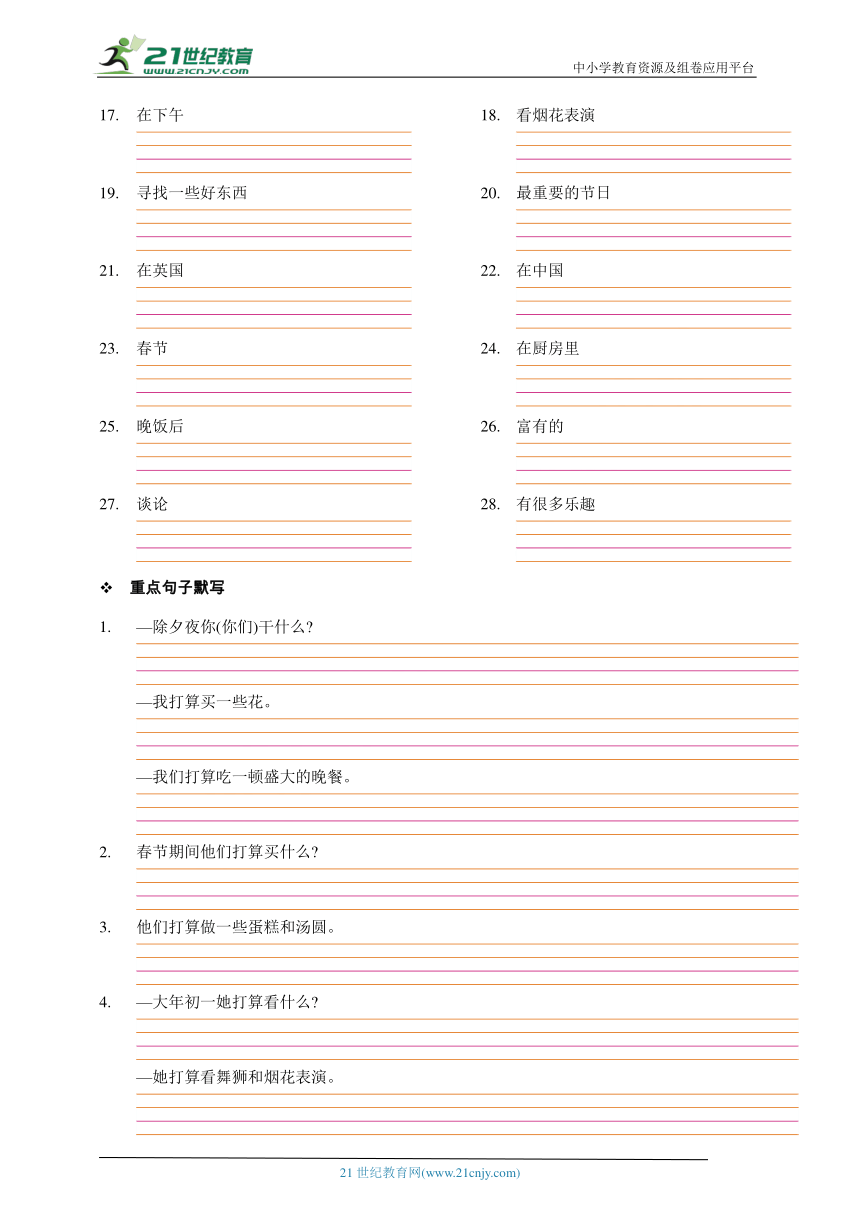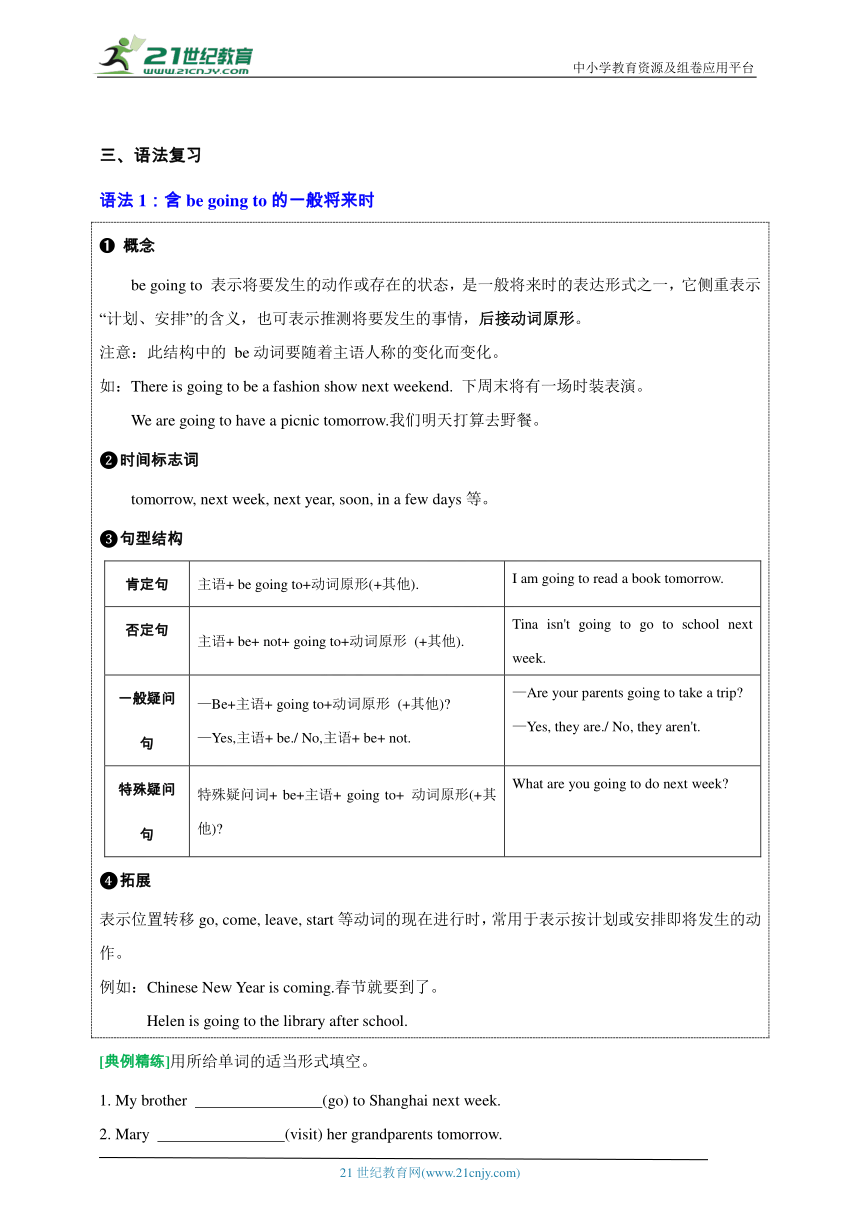Unit 8 Chinese New Year 单元考点梳理(含答案)
文档属性
| 名称 | Unit 8 Chinese New Year 单元考点梳理(含答案) |

|
|
| 格式 | docx | ||
| 文件大小 | 254.2KB | ||
| 资源类型 | 试卷 | ||
| 版本资源 | 牛津译林版 | ||
| 科目 | 英语 | ||
| 更新时间 | 2024-11-29 00:00:00 | ||
图片预览




文档简介
中小学教育资源及组卷应用平台
译林版(六上) 期末复习讲练测 考点梳理
Unit 8 Chinese New Year
字母组合“oo”的发音
The cook is looking at a cookbook. 厨师正在看一本食谱 To look for something good. 去寻找一些好的东西 The cook is looking at a cookbook. 厨师正在看一本食谱 To cook us something good. 给我们做点好吃的 读音指导 总结:字母组合oo在k前,w后以及good, foot, stood中发短音/u/ 拓展:字母组合oo在这里发长音/u:/,如:school,afternoon 字母组合oo还可以发/ /,如:blood, flood
[典型考题] 选出与所给单词画线部分读音不同的一项。
( )1. A. toothache B. foot C. cool D. food
( )2. A. good B. foolish C. bedroom D. moon
( )3. A. foolish B. cook C. food D. school
( )4.A.school B.zoo C.look D.cool
( )5.A.wood B.foolish C.food D.room
重点词句默写通关
重点单词默写
1. 收到, 接到
2. 食物, 食品
3. 汤圆
4. 烟花表演
5. 鞭炮
6. 富有的,有钱的
7. 计划, 打算
8. 好极了
9. 点燃
重点短语默写
1. 大年初一,春节
2. 即将来临
3. 得到一封邮件
4. 香港
5. 打算做某事
6. 下周
7. 兴奋的,激动的
8. 买些新衣服
9. 在晚上
10. 做蛋糕
11. 大年夜,除夕
12. 吃晚饭
13. 买些花
14. 在大年初一
15. 红包
16. 舞狮
17. 在下午
18. 看烟花表演
19. 寻找一些好东西
20. 最重要的节日
21. 在英国
22. 在中国
23. 春节
24. 在厨房里
25. 晚饭后
26. 富有的
27. 谈论
28. 有很多乐趣
重点句子默写
1. —除夕夜你(你们)干什么
—我打算买一些花。
—我们打算吃一顿盛大的晚餐。
2. 春节期间他们打算买什么
3. 他们打算做一些蛋糕和汤圆。
4. —大年初一她打算看什么
—她打算看舞狮和烟花表演。
语法复习
语法1:含be going to的一般将来时
概念 be going to 表示将要发生的动作或存在的状态,是一般将来时的表达形式之一,它侧重表示“计划、安排”的含义,也可表示推测将要发生的事情,后接动词原形。 注意:此结构中的 be动词要随着主语人称的变化而变化。 如:There is going to be a fashion show next weekend. 下周末将有一场时装表演。 We are going to have a picnic tomorrow.我们明天打算去野餐。 时间标志词 tomorrow, next week, next year, soon, in a few days等。 句型结构 肯定句主语+ be going to+动词原形(+其他).I am going to read a book tomorrow.否定句主语+ be+ not+ going to+动词原形 (+其他).Tina isn't going to go to school next week.一般疑问句—Be+主语+ going to+动词原形 (+其他) —Yes,主语+ be./ No,主语+ be+ not.—Are your parents going to take a trip —Yes, they are./ No, they aren't.特殊疑问句特殊疑问词+ be+主语+ going to+ 动词原形(+其他) What are you going to do next week
拓展 表示位置转移go, come, leave, start等动词的现在进行时,常用于表示按计划或安排即将发生的动作。 例如:Chinese New Year is coming.春节就要到了。 Helen is going to the library after school.
[典例精练]用所给单词的适当形式填空。
1. My brother (go) to Shanghai next week.
2. Mary (visit) her grandparents tomorrow.
3. David and Tommy (give) a puppet show next Monday.
4. I (make) a plan for my study in two days.
5. Miss Li (come). Stop (talk)!
6. She usually (watch) TV at weekends, but next Saturday she (play) football.
语法2:表示时间的介词
时间介词是表示时间的介词。小学阶段常用的时间介词有: at, on, in, at, before, after, by, for, from, since等。 at:用于表示在某个时刻/时间的某一点。如: at noon(在午时), at night(在夜间), at present(目前)。 on:用于在星期、某天、某天的上午/下午/晚上(指具体的某一天时)。如: on Sunday(在星期天), on Sunday morning(在星期天的上午), on March 8(在3月8日)。 in (1)用于表示周、月、季节、年,也泛指上午、下午、晚上。如: in 1999(在1999年), in November(在11 月份), in summer(在夏季), in the afternoon(在下午)。 (2)过……后(未来时间)。如: I think he will be back in an hour.我想他1小时后就会回来。 before:在······前。如: Wei Hua got up before 7 o’clock this morning.今天早晨,魏华在7 点之前起床了。 after:在······之后。如: After that, no one should ever kill wild animals. 在那之后,任何人不得捕杀野生动物。 ● for:……之久(表示过了多少时间),可以和一般现在时、过去时、将来时连用。如: Peter often works for four hours on Sunday.彼得经常在周日工作4个小时。 ● from:从······起(时间)。如: Sarah studies from 7 in the morning to 7 in the evening. 萨拉从早上7点学习到晚上7点。
[典例精练]一、在横线上填入合适的时间介词。
1. They have a PE lesson ________ Monday.
2. Classes begin ________8:00.
3. We have four lessons ________ the morning.
4. I watch TV play ________ Friday evening.
5. My sister plays basketball ________ half past four ________the afternoon.
二、单项选择。
( )1. Children get gifts ________ Christmas and ________ their birthdays.
A. on; on B. at; on C. in; on
( )2. A lot of children were born ________ the year of the dragon.
A. in B. on C. at
( )3. The girl came ________ a rainy night.
A. in B. on C. at
( )4. My birthday is ________ the first of September.
A. in B. on C. at
典例精练答案
一、语音:BABCA
二、重点词句默写答案
重点单词:
1. get 2. food 3. tangyuan
4. fireworks 5. firecracker 6. rich
7. plan 8. hooray 9. light
重点短语:
10. Chinese New Year's Day 11. be coming
12. get an email 13. Hong Kong
14. be going to do sth. 15. next week
16. be excited 17. buy some new clothes
18. in the evening 19. make cakes
20. Chinese New Year's Eve
21. have dinner 22. buy some flowers
23. on Chinese New Year's Day
24. red packet 25. lion dance
26. in the afternoon 27. watch fireworks
28. look for something good
29. the most important festival
30. in the UK 31. in China
32. Spring Festival 33. in the kitchen
34. after dinner 35. be rich
36. talk about 37. have a lot of fun
重点句子:
38.—What are you going to do on Chinese New Year's Eve
—I'm going to buy some flowers.
—We' re going to have a big dinner.
39. What are they going to buy at Chinese New Year
40. They' re going to make some cakes and tangyuan.
41.—What is she going to watch on Chinese New Year's Day
—She's going to watch a lion dance and fireworks.
[语法1]
1. is going 2. is going to visit 3. are going to give 4. am going to make 5. is coming; talking 6. watches; is going to play
[语法2]
一、1. on 2. at 3. in 4. on 5. at, in
1.在某一天用介词 on,故填 on。
2.在某一个时间点用介词 at,故填at。
3.在早上/中午/晚上用介词 in,故填in。
4.在某一天的早上/中午/晚上用介词 on,故填 on。
5.在某一个时间点用介词 at,在早上/中午/晚上用介词 in,故填 at, in。
二、1~4 BA BB
1.在某个节日用 at,在某一天用 on,故选 B。
2.在某一年用 in,故选 A。
3.在某一天的晚上用 on,故选B。
21世纪教育网(www.21cnjy.com)
译林版(六上) 期末复习讲练测 考点梳理
Unit 8 Chinese New Year
字母组合“oo”的发音
The cook is looking at a cookbook. 厨师正在看一本食谱 To look for something good. 去寻找一些好的东西 The cook is looking at a cookbook. 厨师正在看一本食谱 To cook us something good. 给我们做点好吃的 读音指导 总结:字母组合oo在k前,w后以及good, foot, stood中发短音/u/ 拓展:字母组合oo在这里发长音/u:/,如:school,afternoon 字母组合oo还可以发/ /,如:blood, flood
[典型考题] 选出与所给单词画线部分读音不同的一项。
( )1. A. toothache B. foot C. cool D. food
( )2. A. good B. foolish C. bedroom D. moon
( )3. A. foolish B. cook C. food D. school
( )4.A.school B.zoo C.look D.cool
( )5.A.wood B.foolish C.food D.room
重点词句默写通关
重点单词默写
1. 收到, 接到
2. 食物, 食品
3. 汤圆
4. 烟花表演
5. 鞭炮
6. 富有的,有钱的
7. 计划, 打算
8. 好极了
9. 点燃
重点短语默写
1. 大年初一,春节
2. 即将来临
3. 得到一封邮件
4. 香港
5. 打算做某事
6. 下周
7. 兴奋的,激动的
8. 买些新衣服
9. 在晚上
10. 做蛋糕
11. 大年夜,除夕
12. 吃晚饭
13. 买些花
14. 在大年初一
15. 红包
16. 舞狮
17. 在下午
18. 看烟花表演
19. 寻找一些好东西
20. 最重要的节日
21. 在英国
22. 在中国
23. 春节
24. 在厨房里
25. 晚饭后
26. 富有的
27. 谈论
28. 有很多乐趣
重点句子默写
1. —除夕夜你(你们)干什么
—我打算买一些花。
—我们打算吃一顿盛大的晚餐。
2. 春节期间他们打算买什么
3. 他们打算做一些蛋糕和汤圆。
4. —大年初一她打算看什么
—她打算看舞狮和烟花表演。
语法复习
语法1:含be going to的一般将来时
概念 be going to 表示将要发生的动作或存在的状态,是一般将来时的表达形式之一,它侧重表示“计划、安排”的含义,也可表示推测将要发生的事情,后接动词原形。 注意:此结构中的 be动词要随着主语人称的变化而变化。 如:There is going to be a fashion show next weekend. 下周末将有一场时装表演。 We are going to have a picnic tomorrow.我们明天打算去野餐。 时间标志词 tomorrow, next week, next year, soon, in a few days等。 句型结构 肯定句主语+ be going to+动词原形(+其他).I am going to read a book tomorrow.否定句主语+ be+ not+ going to+动词原形 (+其他).Tina isn't going to go to school next week.一般疑问句—Be+主语+ going to+动词原形 (+其他) —Yes,主语+ be./ No,主语+ be+ not.—Are your parents going to take a trip —Yes, they are./ No, they aren't.特殊疑问句特殊疑问词+ be+主语+ going to+ 动词原形(+其他) What are you going to do next week
拓展 表示位置转移go, come, leave, start等动词的现在进行时,常用于表示按计划或安排即将发生的动作。 例如:Chinese New Year is coming.春节就要到了。 Helen is going to the library after school.
[典例精练]用所给单词的适当形式填空。
1. My brother (go) to Shanghai next week.
2. Mary (visit) her grandparents tomorrow.
3. David and Tommy (give) a puppet show next Monday.
4. I (make) a plan for my study in two days.
5. Miss Li (come). Stop (talk)!
6. She usually (watch) TV at weekends, but next Saturday she (play) football.
语法2:表示时间的介词
时间介词是表示时间的介词。小学阶段常用的时间介词有: at, on, in, at, before, after, by, for, from, since等。 at:用于表示在某个时刻/时间的某一点。如: at noon(在午时), at night(在夜间), at present(目前)。 on:用于在星期、某天、某天的上午/下午/晚上(指具体的某一天时)。如: on Sunday(在星期天), on Sunday morning(在星期天的上午), on March 8(在3月8日)。 in (1)用于表示周、月、季节、年,也泛指上午、下午、晚上。如: in 1999(在1999年), in November(在11 月份), in summer(在夏季), in the afternoon(在下午)。 (2)过……后(未来时间)。如: I think he will be back in an hour.我想他1小时后就会回来。 before:在······前。如: Wei Hua got up before 7 o’clock this morning.今天早晨,魏华在7 点之前起床了。 after:在······之后。如: After that, no one should ever kill wild animals. 在那之后,任何人不得捕杀野生动物。 ● for:……之久(表示过了多少时间),可以和一般现在时、过去时、将来时连用。如: Peter often works for four hours on Sunday.彼得经常在周日工作4个小时。 ● from:从······起(时间)。如: Sarah studies from 7 in the morning to 7 in the evening. 萨拉从早上7点学习到晚上7点。
[典例精练]一、在横线上填入合适的时间介词。
1. They have a PE lesson ________ Monday.
2. Classes begin ________8:00.
3. We have four lessons ________ the morning.
4. I watch TV play ________ Friday evening.
5. My sister plays basketball ________ half past four ________the afternoon.
二、单项选择。
( )1. Children get gifts ________ Christmas and ________ their birthdays.
A. on; on B. at; on C. in; on
( )2. A lot of children were born ________ the year of the dragon.
A. in B. on C. at
( )3. The girl came ________ a rainy night.
A. in B. on C. at
( )4. My birthday is ________ the first of September.
A. in B. on C. at
典例精练答案
一、语音:BABCA
二、重点词句默写答案
重点单词:
1. get 2. food 3. tangyuan
4. fireworks 5. firecracker 6. rich
7. plan 8. hooray 9. light
重点短语:
10. Chinese New Year's Day 11. be coming
12. get an email 13. Hong Kong
14. be going to do sth. 15. next week
16. be excited 17. buy some new clothes
18. in the evening 19. make cakes
20. Chinese New Year's Eve
21. have dinner 22. buy some flowers
23. on Chinese New Year's Day
24. red packet 25. lion dance
26. in the afternoon 27. watch fireworks
28. look for something good
29. the most important festival
30. in the UK 31. in China
32. Spring Festival 33. in the kitchen
34. after dinner 35. be rich
36. talk about 37. have a lot of fun
重点句子:
38.—What are you going to do on Chinese New Year's Eve
—I'm going to buy some flowers.
—We' re going to have a big dinner.
39. What are they going to buy at Chinese New Year
40. They' re going to make some cakes and tangyuan.
41.—What is she going to watch on Chinese New Year's Day
—She's going to watch a lion dance and fireworks.
[语法1]
1. is going 2. is going to visit 3. are going to give 4. am going to make 5. is coming; talking 6. watches; is going to play
[语法2]
一、1. on 2. at 3. in 4. on 5. at, in
1.在某一天用介词 on,故填 on。
2.在某一个时间点用介词 at,故填at。
3.在早上/中午/晚上用介词 in,故填in。
4.在某一天的早上/中午/晚上用介词 on,故填 on。
5.在某一个时间点用介词 at,在早上/中午/晚上用介词 in,故填 at, in。
二、1~4 BA BB
1.在某个节日用 at,在某一天用 on,故选 B。
2.在某一年用 in,故选 A。
3.在某一天的晚上用 on,故选B。
21世纪教育网(www.21cnjy.com)
